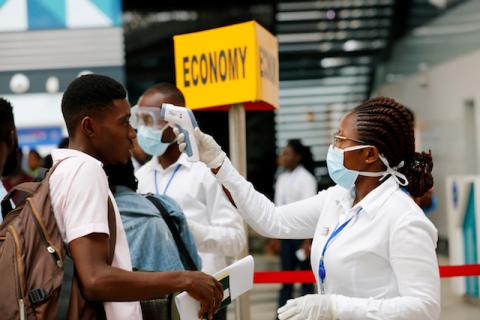Advertisement
'Fragile' Africa prepares for high risk of coronavirus spread
DAKAR/LONDON (Reuters) - An isolation ward stands ready at a hospital in Khartoum, Sudan. Laboratories in Senegal and Madagascar have the testing equipment they need. Passengers arriving at airports in Gambia, Cameroon and Guinea are being screened for fever and other viral symptoms.
Africa's Centres for Disease Control and Prevention says it has activated its emergency operation centre in the face of what global health officials say is a high risk the coronavirus disease epidemic that began in China will spread to its borders.
On a poor continent where healthcare capacity is limited, early detection of any outbreak will be crucial.
The fear is great that a spreading epidemic of coronavirus infections will be hard to contain in countries where health systems are already overburdened with cases of Ebola, measles, malaria and other deadly infectious diseases.
"The key point is to limit transmission from affected countries and the second point is to ensure that we have the capacity to isolate and also to provide appropriate treatment to people that may be infected," said Michel Yao, emergency operations program manager at the World Health Organization's regional office for Africa in Brazzaville, Congo.
The Democratic Republic of Congo is barring its citizens from flying to China. Burkina Faso has asked Chinese citizens to delay travelling to Burkina, and is warning that they face quarantine if they do. Kenya, Tanzania and Rwanda have all suspended flights to China.
"What we are emphasising to all countries is that they should at least have early detection," Yao said.
"We know how fragile the health system is on the African continent and these systems are already overwhelmed by many ongoing disease outbreaks, so for us it is critical to detect earlier to that we can prevent the spread."
John Nkengasong, Africa's CDC director, told a briefing in the Ethiopian capital Addis Ababa this week that the activation of the emergency operation centre would create a single incident system to manage the outbreak across the continent.
The Africa CDC will also hold a training workshop in Senegal for 15 African countries on laboratory diagnosis, he said.
The continent has more than doubled the number of laboratories now equipped to diagnose the viral infection, this week adding facilities in Ghana, Madagascar and Nigeria and to established testing labs in South Africa and Sierra Leone.
"By the end of the week we expect that an additional 24 countries (in Africa) will receive the reagents needed to conduct the tests and will have the test running," a spokeswoman for the WHO's Africa Region told Reuters.
(Additional reporting by Giulia Paravicini in Addis Ababa, Benoit Nyemba in Kinshasa, Thiam Ndiaga in Ouagadougou, Josiane Kouagheu in Douala, Pap Saine in Banjul and Saliou Samb in Conakry. Writing and reporting by Kate Kelland; Editing by Pravin Char)



















Add new comment